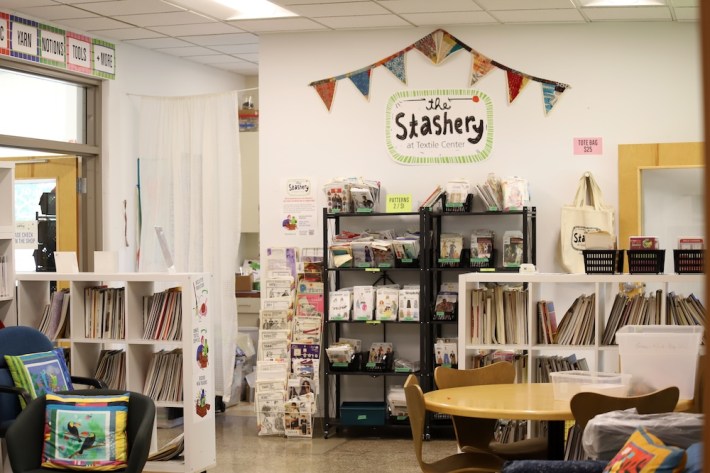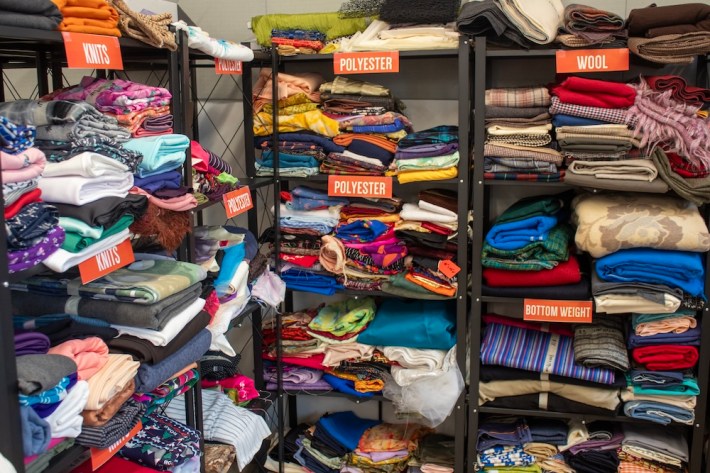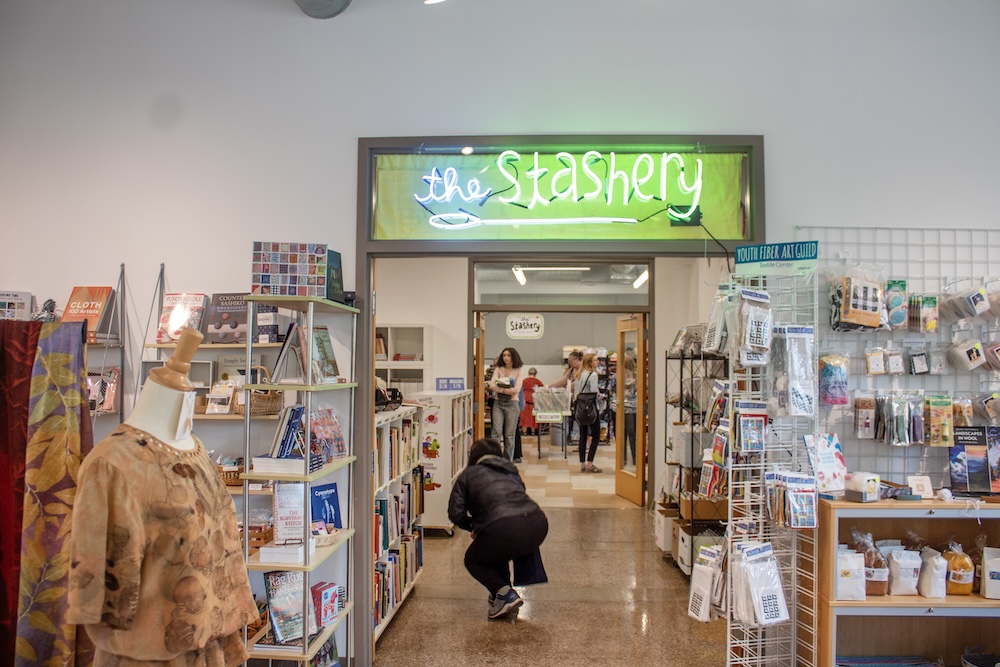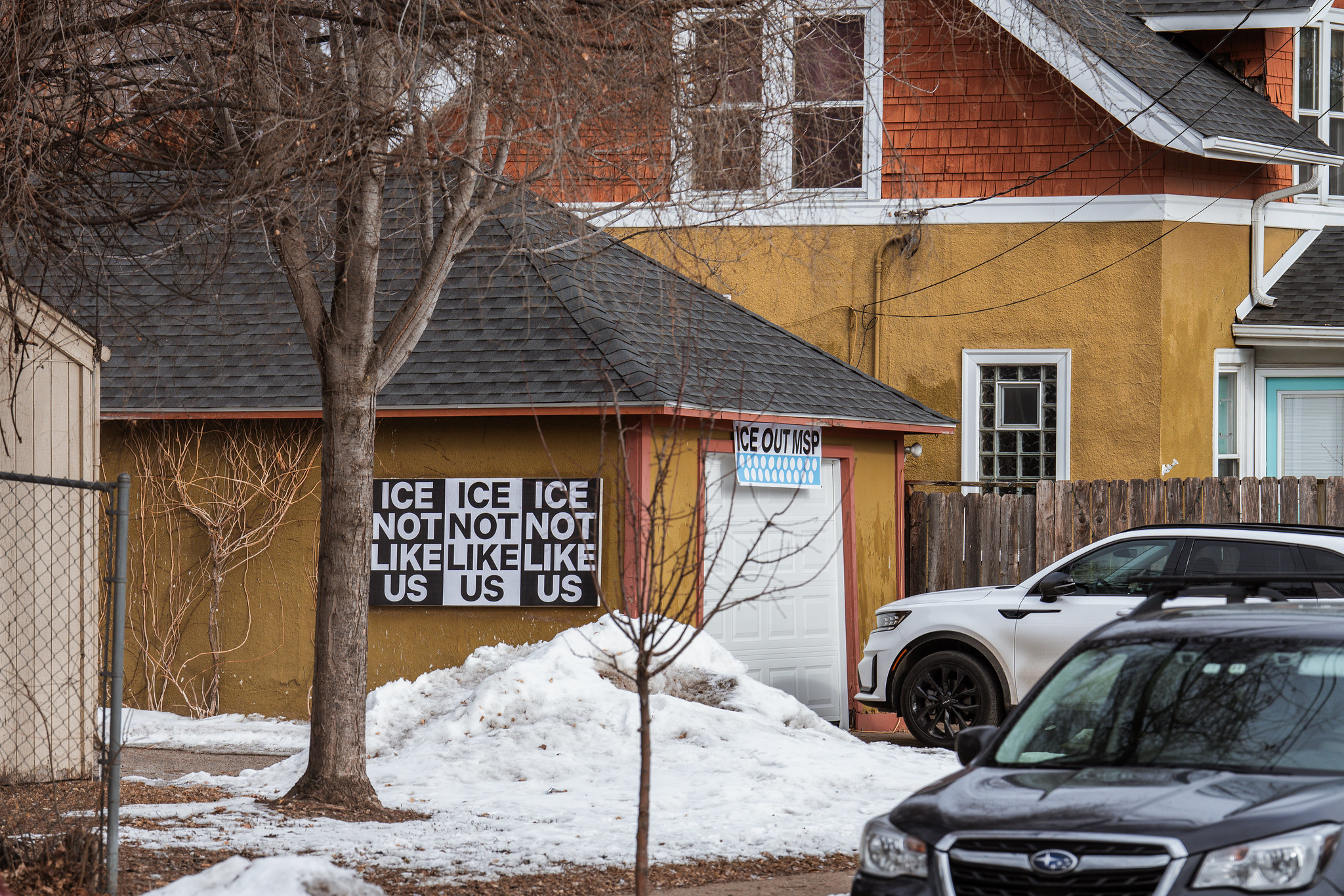When I stepped into the Stashery, the recently opened secondhand fiber arts supply shop at Prospect Parks' Textile Center, I was overwhelmed. In a good way: by the colors, the textures, and the artistic possibilities. Shelving units run along two of the walls, filled with stacks of cotton, wool, flannel, fleece, polyester, and silk fabrics. Another wall holds bins of yarn, organized by fiber. There are drawers of circular knitting needles, bins of cross-stitch kits, and clear zip-top bags stuffed with fabric scraps.
Even better than the wide-ranging selection are the prices: Those circular knitting needles (which retail for about $10) are $2. Fill up a sandwich-sized plastic bag with spools and bobbins of thread for $2. Zippers are two for $1, and needlecraft books are $1 each. I spotted a sweater’s worth of high-quality wool yarn for $40 and had to give myself a stern talking to about the sweater-in-progress I already had at home.
“Everything’s priced to move,” says Textile Center director of operations Erin Husted, who oversees the Stashery. “We're looking to get this stuff into the hands of people who want to make things.”
Although the Stashery is a recent addition, it’s in keeping with the longtime mission of Textile Center, the Minneapolis nonprofit that launched in 1994 to provide a space for textile artists to gather, exhibit their work, and teach and attend classes. Today, the organization supports over 20 different fiber arts guilds and offers over 200 classes per year, ranging from intro-level knitting classes to weeklong workshops for experienced fiber artists. Textile Center’s space is home to a shop with items by local fiber artists, a community room, three galleries and a guild display wall, the country’s largest circulating fiber art library, four classrooms, and a dye lab. Outside, a dye garden wraps around the building, blooming with indigo, marigold, and other plants that can be used to dye textiles.

“What I love about Textile Center is that it's one of those rare third spaces that you can hang out in that is free,” Husted says. “You don't have to be a member to come here. You don't have to take a class. You can just come, walk through the galleries, hang out in the community room, peruse the library.”
Twice a year, Textile Center is transformed into a building-wide garage sale, an event that’s hugely popular both with bargain hunters and those looking to declutter.
“People would call us weekly and ask, ‘Can I donate?’” Husted says. “I thought, there's really a demand for people to donate, and we know there's a demand for secondhand supplies. Is there a way we can make this a year round option?”
Enter the Stashery, which opened on May 30 and is housed in a former classroom space. Donations can be made by appointment—there’s so much demand that the daily slots are booked about a month out. Items are sorted, priced, and stocked by a team of volunteers, who also keep the shop tidy.
“We are so lucky to have an incredibly active volunteer community at Textile Center,” Husted says. “We have three to five volunteers every day coming in and helping.”
Staff at the adjacent artisan shop handle checkout and other customer service needs, and Stashery proceeds help pay Textile Center staff, fund guest teaching artists, and provide additional scholarship opportunities for classes. Items are priced at a 75% discount from retail prices in order to make fiber art a bit more accessible. It's also a great option for eco-conscious crafters who want to reuse supplies rather than buying new items, beginners who aren’t quite confident enough to commit to a $30 skein of hand-dyed yarn, and quilters looking for a small amount of fabric to finish a project.

“If you're interested in sewing, I would look here first before you go buying a machine, because we get quality sewing machines,” Husted says. “We've got these really incredibly nice embroidery machines that are incredibly expensive. They're like $4,000 machines that we're able to sell for a quarter of that price.”
One thing she can’t keep in stock? “Embroidery floss is the most popular thing we sell—if anyone wants to donate embroidery floss, I’ll take it!” she says with a laugh.
Reception to the Stashery has been overwhelmingly positive. “We're getting a lot of traffic to the building, which is amazing,” says Husted, noting that the space has helped bring in new visitors from the local re-use community. The Stashery is open Tuesday to Saturday from 10 a.m. to 4 p.m., with extended hours until 7 p.m. on Thursday. Follow the Stashery on Instagram for weekly highlights of unique items, or stop by the shop to peruse in person.
“Because we get donations daily, what we have in stock is constantly changing,” Husted says. “One of my favorite things to do is to be in the shop and just listen to how excited people get with what they find.”






